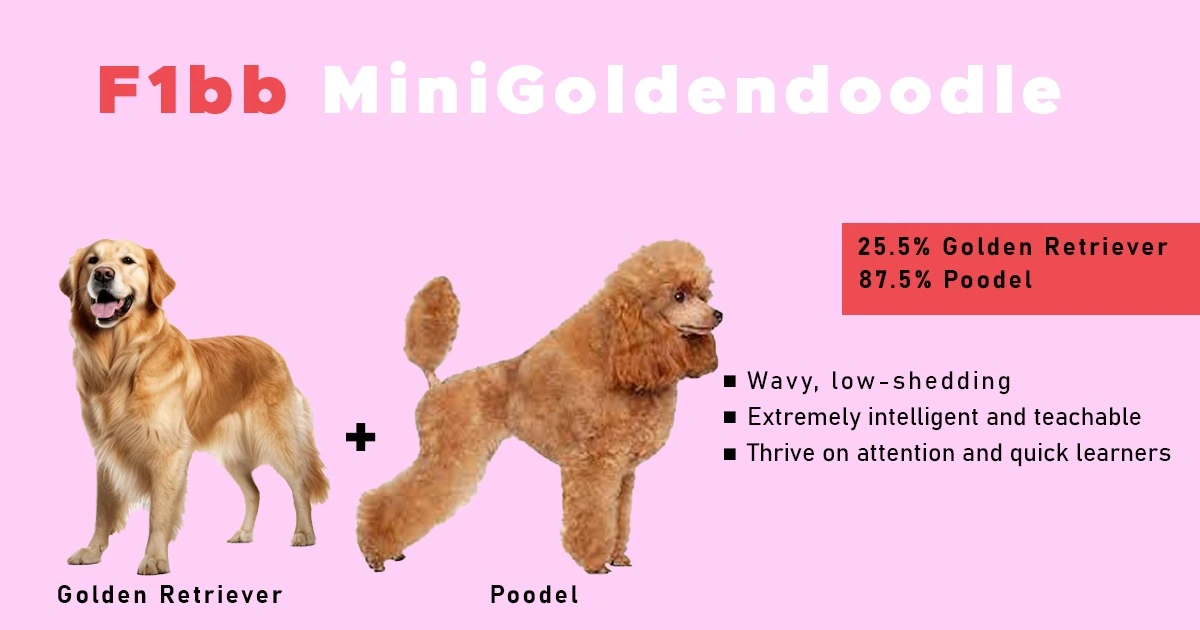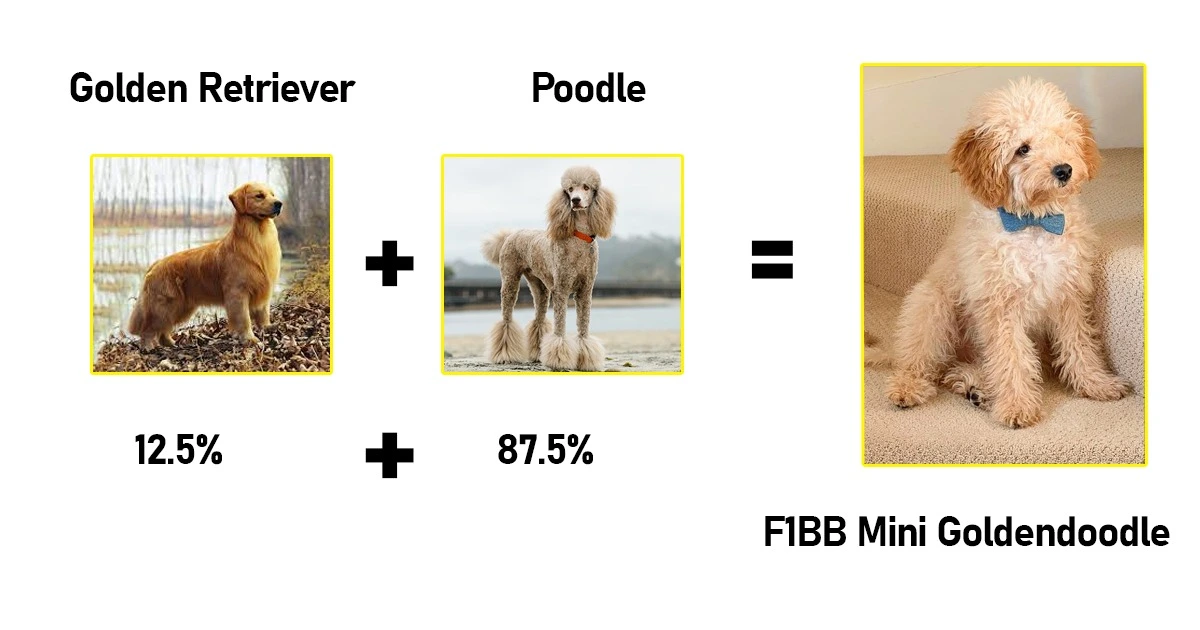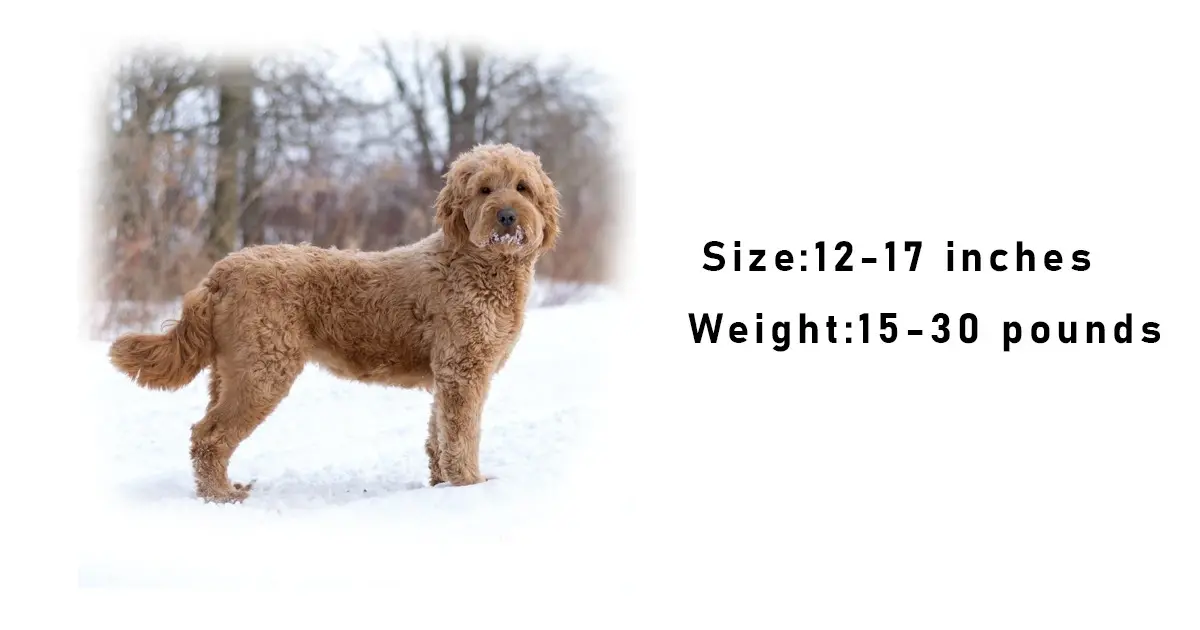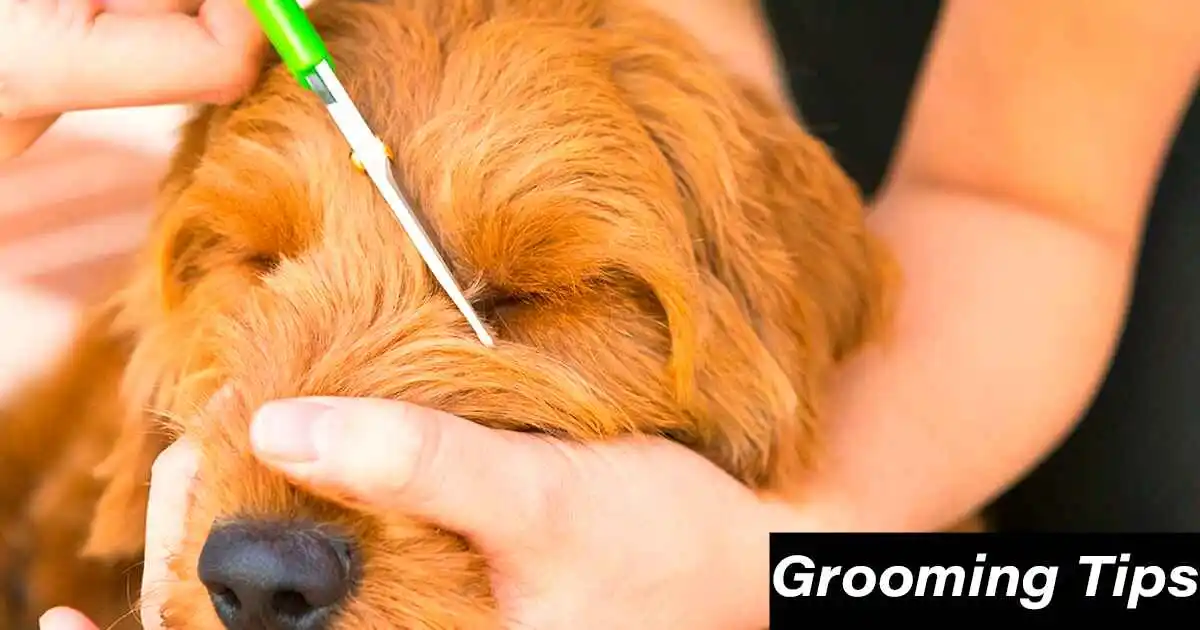F1BB Mini Goldendoodles are a cross between an F1B Mini Goldendoodle and a Miniature Poodle, resulting in a dog that is 12.5% Golden Retriever and 87.5% Poodle. They typically weigh 10-25 pounds and have a very curly, non-shedding coat.F1BB Mini Goldendoodles are excellent family dogs known for their affection, friendliness, and patience with children and other pets.
They are highly intelligent and have inherited the hypoallergenic qualities of the Poodle, making them a great choice for families with moderate to severe pet allergies. To ensure a healthy and well-adjusted F1BB Mini Goldendoodle, it is essential to select a reputable breeder, provide proper nutrition and exercise, commit to consistent training and socialization, and attend to their health and grooming needs.
Table of Contents
ToggleBuilding a strong bond through quality time together, positive reinforcement, and being your dog’s advocate will create a lifelong companionship filled with joy and love. Regular mental stimulation, such as puzzle toys, obedience training, and interactive play, is crucial for keeping your F1BB Mini Goldendoodle’s mind engaged and preventing boredom. Equipping your pup with a Fi Dog Collar can also help keep them safe by tracking their location, activity levels, and sleep patterns, while alerting you if they escape.
Qualities of F1BB Mini Goldendoodles
An F1BB Mini Goldendoodle is a specific type of Mini Goldendoodle resulting from the breeding of an F1B Goldendoodle (75% Poodle, 25% Golden Retriever) back to a Poodle. This makes the F1BB Mini Goldendoodle 87.5% Poodle and 12.5% Golden Retriever, leading to a dog that typically has a curlier, more hypoallergenic coat compared to other generational types. These dogs are especially popular among people with allergies due to their low-shedding coats.
Hypoallergenic Coats:
Hypoallergenic coats, particularly in mini Goldendoodles, are a marvel of nature’s design. These adorable hybrids inherit their hypoallergenic traits from their Poodle lineage, making them a top choice for individuals with sensitivities or allergies. The wavy, low-shedding fur of mini Goldendoodles isn’t just aesthetically pleasing; it’s a practical solution for households where allergies are a concern.
The unique combination of Golden Retriever and Poodle genetics results in coats that are not only hypoallergenic but also soft to the touch and luxurious in appearance. Mini Goldendoodles often boast a variety of colors and patterns in their coats, adding to their charm and appeal.
Beyond their hypoallergenic properties, mini Goldendoodles are renowned for their friendly and affectionate personalities, making them wonderful companions for individuals and families alike. Their playful nature and intelligence make them easy to train and integrate into various lifestyles.

Furthermore, the manageable size of mini Goldendoodles makes them suitable for apartment living or smaller homes, while still providing all the joy and companionship of a larger dog breed. Their adaptability and compatibility with different living situations contribute to their popularity among pet owners seeking a hypoallergenic canine companion.
In summary, the hypoallergenic coats of mini Goldendoodles offer not only relief for allergy sufferers but also a delightful combination of beauty, intelligence, and companionship for all who welcome them into their homes.
Colors of the Coat:
Mini Goldendoodles arrive in an extensive variety of coat tones, adding to their allure. From dark and cream to apricot and chocolate, there’s a variety to suit each inclination and style.
Notwithstanding their beguiling appearance, F1BB Miniature Goldendoodles are famous for their amicable disposition, insight, and versatility. Whether as a family pet or an ally for people, these canines give pleasure and friendship to any family.
Experience the delight of possessing a F1BB Mini Goldendoodle and find the reason why they are esteemed by so many for their excellent characteristics and adorable nature.
Traits of F1BB Mini Goldendoodles
F1BB Goldendoodles that are smaller than expected have a number of characteristics that set them apart as outstanding companions. One of their most conspicuous attributes is their delicate and lighthearted disposition. In view of their well disposed characters, these canines make magnificent family pets.
Physical attributes:
- – Weight: typically 15-30 pounds
- – Shoulder size: 12-17 inches
Living arrangements:
- – Suitable for apartment living due to small size
- – Enjoy outdoor activities like walks and play
Intelligence and trainability:
- – Extremely intelligent and teachable
- – Thrive on attention and quick learners
Adaptability:
- – Easily adapt to different environments
- – Can become obedient family members with proper training and socialization
Health Considerations for F1BB Mini Goldendoodles
F1BB Mini Goldendoodles, like all breeds, are susceptible to certain health issues. In any case, the Poodle characteristics in their family line add to their overall extraordinary prosperity.
Lifespan:
F1B Mini Goldendoodles typically enjoy a lifespan ranging between 12 to 15 years, offering a substantial amount of time for companionship and bonding with their families. This extended lifespan is a testament to their overall health and vitality when provided with proper care and attention.
These steps increase the lifespan
- Regular exercise, such as daily walks or playtime, helps maintain their physical health and mental well-being.
- Providing a nutritious diet formulated for small to medium-sized breeds supports their overall health and longevity.
- Routine veterinary check-ups and preventive care, including vaccinations and dental exams, can help identify and address any potential health issues early on, increasing their lifespan and quality of life.
Comparisons: F1B vs. F1BB
When comparing F1B and F1BB Goldendoodles, the primary differences lie in their coat types and hypoallergenic properties. F1B Goldendoodles (75% Poodle, 25% Golden Retriever) have wavy to curly coats, making them relatively low-shedding and suitable for allergy sufferers. F1BB Goldendoodles, with an even higher percentage of Poodle genetics, often have curlier coats and are more hypoallergenic than F1B Goldendoodles.
The choice between F1B and F1BB often depends on the desired coat type and the level of hypoallergenicity required by the owner.
Genetic health advantages:
One of the key advantages of F1B Mini Goldendoodles is their reduced risk of genetic medical issues compared to some purebred dogs. This is due to the phenomenon known as hybrid vigor, which often results in offspring inheriting a combination of the best traits from both parent breeds.

- Responsible breeding practices, including health screenings of parent dogs, help minimize the risk of passing on genetic health issues to offspring.
- Regular grooming, including brushing their coat and cleaning their ears, helps prevent common health issues such as matting and ear infections.
- Providing a safe and stimulating environment, including appropriate socialization and mental enrichment, contributes to their overall well-being and reduces stress-related health issues.
However, it’s important to note that while they may have fewer inherited health issues, it’s not a guarantee of perfect health. Responsible breeders play a crucial role in maintaining and promoting the health of the breed through health screenings and genetic testing.
These measures help identify and mitigate potential health risks, ensuring that puppies are born healthy and have the best chance at a long, happy life. To ensure the continued health of F1B Mini Goldendoodles:
Care and maintenance:
To ensure the well-being and longevity of F1B Mini Goldendoodles, it’s essential to provide them with proper care and maintenance. This includes regular exercise, a balanced diet, and routine veterinary visits. Regular exercise helps keep them physically fit, mentally stimulated, and prevents obesity, which can lead to various health problems.
- Providing adequate mental stimulation through interactive toys, puzzle games, and training sessions helps prevent boredom and promotes mental well-being.
- Creating a safe and secure environment within the home, including puppy-proofing living spaces and providing a comfortable sleeping area, fosters a sense of security and reduces stress-related behaviors.
- Establishing a consistent grooming routine, including regular baths, nail trims, and dental care, not only keeps them looking their best but also contributes to their overall health and hygiene.
Popularity and Care
F1BB Mini Goldendoodles are highly sought after for their friendly, intelligent, and trainable nature. They require regular grooming to maintain their coats, along with standard care such as balanced nutrition, regular vet check-ups, and daily exercise. Their activity level is moderate to high, meaning they enjoy playtime and walks but can adapt to less active lifestyles if needed. These dogs are well-suited for families, singles, and seniors due to their adaptable and affectionate nature.
Key Points:
- F1BB Mini Goldendoodles are 87.5% Poodle, 12.5% Golden Retriever.
- Have curlier, more hypoallergenic coats than F1B Goldendoodles.
- Require regular grooming, balanced diet, and daily exercise.
- Known for their friendly, intelligent, and trainable nature.
Training and Socialization Tips for F1BB Mini Goldendoodles
To guarantee that F1BB Mini Goldendoodles develop into even and dedicated sidekicks, readiness and socialization are vital. Training and socialization for F1BB Mini Goldendoodles typically involve gentle yet consistent methods, as they tend to inherit predictable traits, while F2 Mini Goldendoodles may require more varied approaches due to their potentially diverse genetic makeup and temperament variability.
These canines blossom with satisfying their proprietors and answer well to encouraging feedback preparing strategies. Consistency, tolerance, and affirmation assume vital parts in actually preparing your F1BB Miniature Goldendoodle. Here are some key points to consider in preparing your F1BB Mini Goldendoodle:
- Start training your puppy early to establish good behaviors and prevent potential social issues.
- Present fundamental submission orders like sit, remain, and come to your doggy all along, especially assuming that there are youngsters in the family.
- To help your Mini Goldendoodle become more self-assured and well-adjusted, expose them to a variety of people, animals, and environments.

As well as preparing, socialization is a fundamental part of raising a balanced F1BB Mini Goldendoodle. Normal openness to new encounters like various sounds, sights, and scents is crucial. This openness will add to their agreeableness and friendliness as they mature, lessening the probability of dread or hostility in new circumstances.
Grooming Needs for F1BB Mini Goldendoodles
F1BB Mini Goldendoodles have a stunning curly coat that requires regular grooming to keep looking its best. Their low-shedding and hypoallergenic fur seeks after them a popular choice for those with responsive qualities.
Size and Characteristics
F1BB Mini Goldendoodles are small-sized dogs, typically weighing between 15 to 35 pounds and standing 13 to 20 inches tall at the shoulder when fully grown. Their size makes them an excellent choice for those who live in apartments or smaller homes but still want an active and affectionate pet. The increased percentage of Poodle in their genetic makeup often results in a more compact and manageable size compared to F1 Mini Goldendoodle or F1B Goldendoodles.
Grooming requirements:
- – Frequent brushing to avoid matting and tangling
- – Professional grooming recommended for trimming and cleanliness
Bathing and ear care:
- – Bathe as needed with gentle dog shampoo for sensitive skin
- – Consistent ear check-ups and cleanings to protect against infections
Nail trimming:
- – Regular trimming to maintain comfortable length
Best Food for F1BB Mini Goldendoodle
A balanced diet supports their hypoallergenic coat, keeping it shiny and reducing the risk of skin issues. Additionally, the best food for Goldendoodles helps prevent obesity, a common concern in small breeds, and supports joint health, which is vital for maintaining their active and playful nature. By providing the best food for Goldendoodles, owners can help their F1BB Mini Goldendoodles thrive and lead healthy, happy lives.
Feeding Guidelines for F1BB Mini Goldendoodles
Dealing with your F1BB Mini Goldendoodle a good and nutritious eating routine is essential for their overall prosperity and success. It is prescribed to take care of them excellent canine food that is explicitly planned for little varieties.
Dog food recommendations:
- – Feed high-quality dog food formulated for small breeds
- – Consider age, weight, and activity level for portion sizes
Feeding practices:
- – Divide daily food intake into several meals to prevent bloating and aid digestion
- Keep an eye on your weight and modify portion sizes as needed.
General care tips:
- – Provide fresh water regularly
- – Avoid feeding them human foods that may be toxic or harmful to dogs
Exercise Requirements for F1BB Mini Goldendoodles
In spite of their little size, F1BB Mini Goldendoodles are a functioning variety that requires customary activity to keep them cheerful and solid.
Exercise needs of F1BB Mini Goldendoodles:
- – Despite small size, they are an active breed
- – Require regular exercise for happiness and health
Recommended activity level:
- – Aim for 30 minutes to an hour of active play daily
- – Activities include walks, yard play, fetch, or agility training
Mental stimulation importance:
- – Vital for intelligent F1BB Mini Goldendoodles
- – Provide puzzle toys, interactive treat-dispensing toys, or obedience training
- – Helps keep their minds sharp and prevents boredom
Finding a reputable breeder for F1BB Mini Goldendoodles
While you’re hoping to bring back a F1BB Miniature Goldendoodle, finding a dependable breeder is significant. A dependable raiser focuses on the prosperity of their doggies by leading wellbeing screenings and hereditary testing to guarantee their canines are healthy.

Examine nearby reproducers and request suggestions from trustworthy sources.
Importance of finding a reputable breeder:
- – Vital for ensuring the health and well-being of the F1BB Miniature Goldendoodle
- – Reputable breeders perform genetic testing and health check-up’s.
- – Local breeders should be thoroughly researched, and recommendations sought
Visiting the breeder:
- – Schedule a visit to meet parent dogs and assess living conditions
- – Reputable breeders will be transparent and provide necessary paperwork
Common Misconceptions about F1BB Mini Goldendoodles
There are a few common misinterpretations about F1BB Miniature Goldendoodles that ought to be tended to.
Designer breeds misconception:
- – Not all designer breeds are identical
- – Each dog may have distinct characteristics and temperaments
Hypoallergenic misconception:
- – Not all F1BB Mini Goldendoodles are always hypoallergenic
- – Allergies can vary, and it’s important to spend time with the dog beforehand
Cost misconception:
- – Some believe designer breeds are too expensive
- – While F1BB Mini Goldendoodles may cost more, it’s justified by careful breeding practices and health screenings by reputable breeders
Conclusion:
Is it true or not that you are looking for a devoted buddy who gives pleasure and warmth into your life each and every day? Look no farther than the beguiling F1BB Miniature Goldendoodle!
This charming and spellbinding variety makes certain to win your love from the second you meet them. With their compelling appeal and warm nature, they’re the ideal expansion to any family, bringing unending affection, chuckling, and cuddles into your home.
Here’s the reason adding a Mini Goldendoodle to your family is a fabulous thought:
- They’re staggeringly charming, with their cushy covers and charming countenances.
- Mini Goldendoodles are known for their agreeable and friendly characters, making them brilliant allies for individuals, everything being equal.
- These canines are profoundly wise and simple to prepare, making them a delight to have around.
Submerge yourself in a universe of adoration, chuckling, and vast nestles by inviting a Mini Goldendoodle into your life today!
FAQs
An F1BB mini Goldendoodle is a crossbreed between a first-generation (F1) Goldendoodle and a Poodle. The “F” stands for generation, with F1 being the first cross between a Golden Retriever and a Poodle, and the “B” indicates a backcross to a Poodle. “Mini” denotes their smaller size.
F1BB mini Goldendoodles are generally smaller in size, ranging from 15 to 30 pounds when fully grown, depending on factors such as genetics and diet.
While no dog breed is completely hypoallergenic, F1BB mini Goldendoodles are often considered hypoallergenic due to their low-shedding coats inherited from their Poodle parent. However, individual reactions may vary.
F1BB mini Goldendoodles typically have curly or wavy coats that are low to non-shedding. Their coats may vary in color and texture, depending on the genes inherited from their parent breeds.
F1BB mini Goldendoodles are energetic dogs that require regular exercise to stay healthy and happy. Daily walks, playtime, and mental stimulation are essential to prevent boredom and ensure their well-being.
F1BB mini Goldendoodles are known for their friendly and gentle nature, making them excellent companions for children and other pets. Early socialization and training can help reinforce positive behaviors.
F1BB mini Goldendoodles have an average lifespan of 10 to 15 years when properly cared for with a balanced diet, regular exercise, and routine veterinary care.
Yes, F1BB mini Goldendoodles need regular grooming to maintain the health and appearance of their coat. This includes brushing to prevent matting, occasional baths, and regular trimming of their hair and nails.
Yes, F1BB mini Goldendoodles are intelligent and eager to please, making them relatively easy to train.
Make sure you do your homework and pick a breeder who puts their dogs’ health and happiness first. Look for breeders who perform health screenings on their parent dogs and provide proper care for their puppies. Additionally, consider adoption from shelters or rescue organizations as an alternative to purchasing from a breeder.





